Cite this document
(“Mentoring and Counseling in the Workplace Essay”, n.d.)
Mentoring and Counseling in the Workplace Essay. Retrieved from https://studentshare.org/miscellaneous/1523500-mentoring-and-counseling-in-the-workplace
Mentoring and Counseling in the Workplace Essay. Retrieved from https://studentshare.org/miscellaneous/1523500-mentoring-and-counseling-in-the-workplace
(Mentoring and Counseling in the Workplace Essay)
Mentoring and Counseling in the Workplace Essay. https://studentshare.org/miscellaneous/1523500-mentoring-and-counseling-in-the-workplace.
Mentoring and Counseling in the Workplace Essay. https://studentshare.org/miscellaneous/1523500-mentoring-and-counseling-in-the-workplace.
“Mentoring and Counseling in the Workplace Essay”, n.d. https://studentshare.org/miscellaneous/1523500-mentoring-and-counseling-in-the-workplace.


